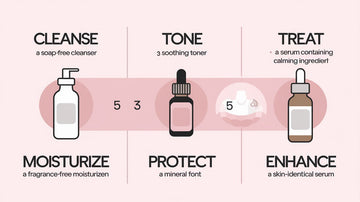Understand Your Skin’s Needs
Sensitive skin can react easily to harsh ingredients, environmental changes, and new products. The main goals are to keep your skin barrier strong, stay hydrated, and minimize irritation. Avoid any product with fragrances, alcohol, or abrasive ingredients, as they can lead to redness, dryness, and inflammation.
Choose a Gentle Cleanser
The foundation of any skincare routine is cleansing, but with sensitive skin, it’s essential to pick a gentle, hydrating cleanser. Look for products labeled as hypoallergenic and free from fragrances and sulfates. A cleanser with soothing ingredients like aloe vera, chamomile, or glycerin can effectively cleanse without stripping away moisture. Use lukewarm water, as hot water can dry out and further irritate sensitive skin.
Focus on a Gentle Moisturizer
Moisturizing is key for sensitive skin to protect the skin barrier and prevent dehydration. Opt for a fragrance-free moisturizer with a simple formula that includes soothing ingredients like hyaluronic acid, ceramides, or squalane. A thicker cream may work well if you have dry, sensitive skin, while a gel moisturizer can be ideal for those with oily or combination-sensitive skin.
Add Sun Protection Daily
Sensitive skin is often more vulnerable to sun damage, so SPF is essential. Look for a mineral-based sunscreen with zinc oxide or titanium dioxide, as these ingredients are less likely to cause irritation than chemical sunscreens. Choose a product labeled as suitable for sensitive skin and apply it every morning, regardless of weather conditions, to protect against harmful UV rays.
Treatments and Serums: Go Slow
If you want to incorporate treatments like serums, choose ones that are specifically made for sensitive skin. Avoid strong acids or active ingredients like high-dose retinoids that can trigger reactions. For example, a serum with low-dose hyaluronic acid, niacinamide, or aloe vera extract can help with hydration and calming redness without overwhelming sensitive skin. Always patch-test new treatments on a small area first.
Exfoliate Carefully
Exfoliation can help remove dead skin cells and brighten the complexion, but with sensitive skin, it’s best to proceed cautiously. Opt for a mild chemical exfoliant like a low-concentration lactic acid once a week, as physical exfoliants can be too harsh. Exfoliating once a week should be enough for sensitive skin to avoid irritation and redness.
Be Consistent, Not Complex
Keeping a skincare routine simple and consistent is crucial for sensitive skin. Avoid trying too many new products at once, and allow each new addition to settle into your routine for a couple of weeks before introducing something else. Consistency helps maintain your skin’s natural barrier and reduces the likelihood of flare-ups.
Conclusion
Building a skincare routine for sensitive skin takes patience and a gentle approach. Focus on gentle, hydrating products with minimal ingredients and steer clear of common irritants like fragrances and alcohol. By listening to your skin and avoiding unnecessary ingredients, you’ll create a routine that protects and nourishes, keeping your skin healthy and balanced.






